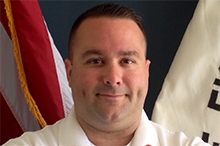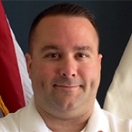

Lt. Brian K. Rand is being honored as a Individual and Community Preparedness Champion of Change.
As an emergency responder, I’ve been taught that all events have a “life cycle.” They consist of a beginning, a middle, and an end. But emergency management and community preparedness do not have a life cycle. They have a beginning, but the task of managing emergencies and preparing our communities is unending.
That’s what I find so exciting about emergency preparedness. Preparedness means getting ready for an event before it happens, even if such an event has never occurred in a given community. I am happy to say that this approach is now guiding emergency services preparedness and training across the country.
Preparing emergency action plans for an event that may or may not occur can be a daunting task; it always requires a great amount of time, effort, research, and training. I have found that it is important to remember two things throughout this difficult process. First, always ask “what if.” And second, never place yourself in the position of having to answer the question of “what do we do now.” Changing the culture of emergency response to be proactive is a major goal we should all strive to achieve.
My work at the Watertown Fire Department has given me a chance to enact my vision of proactive community preparedness. As an example, we have worked with stakeholders to enact policies to deal with opioid overdoses and the pre-hospital treatment of these events. The Department went to great lengths to meet with community activists, hospital officials, and medical directors, as well as to enhance our pre-hospital treatment of overdoses on scene during the event.
Because we saw great success with this program, we are now working with local partners to help change the legislation to have the same medication we provide also available on scene (Naloxone). By educating and changing the culture of how communities perceive an individual who becomes addicted, we gain greater support for important programs that help treat individuals with addictions. The Department offers training to families to help better understand addiction and to save the life of a family member in an emergency. At a minimum, we hope that our education and training will allow an individual who cares for a person afflicted with addiction to have the proper tools to save his or her life.
A piece of advice that I received as a U.S. Marine from my Gunnery Sergeant, Kenneth Crutcher, still guides my thinking today: “If you find yourself with nothing more to do, you are wrong.” This is the mindset you must maintain while creating and implementing emergency preparedness plans of all shapes and sizes. You are never done. You can always go back and make things better.
This is the attitude that ensures emergency preparedness workers build relationships with community members who are needed to create community-centered solutions to emergencies. Engaging these local partner is vital because they will be the ones there in the event of an emergency. Preparing all aspects of a community is the key to success in an ever-changing emergency management landscape here in the United States.
Lt. Brian K. Rand serves as the Emergency Medical Services Coordinator and Training Officer for the Watertown, Massachusetts Fire Department.


